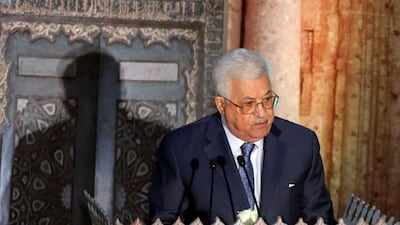The Palestinian cause would be much strengthened if the doors to Jerusalem were open to Arabs without persecution, said Palestine’s president Mahmoud Abbas.
He urged Arab countries to ease their restrictions on travelling to Israel and encourage their people to visit Jerusalem.
More than 20 countries have no diplomatic ties to Israel and refuse to recognise it as a state.
“Do not leave us alone. Going to Jerusalem is not going to Israel and supporting Israel. It is supporting Palestinians,” he said yesterday at the Al Azhar International Conference in Support of Jerusalem, which is taking place in Cairo.
"How can Palestine stand and resist if you cannot support us? This is the land of not only Muslims, but all religions.”
The status of Jerusalem is one of the most sensitive issues in the long-running conflict between Palestine and Israel. That status as regards the Palestinians is now under threat since US president Donald Trump’s announcement recognising the holy city as the capital of Israel, a move that was denounced by the UN and 128 countries.
Israel regards the whole city as its capital, while the Palestinians want the eastern sector as the capital of a future state. Israel occupied East Jerusalem at the same time as the West Bank in 1967 and annexed it in a move that was not recognised by the international community.
For Arabs, entering Jerusalem involves a lengthy and rigorous process and potentially serious problems at home.
Kuwait is among the 20 countries that do not recognise Israel as a state and Kuwaitis risk legal repercussions if they have an Israeli stamp in their passport.
But the country’s chief lawmaker, Marzouq Al Ghanim, said: “To support Jerusalem, we must first know it, its land, its people and its smell, not because it is Palestine’s capital, not because it is an essential part of our origins, not because it is the land of the holy people, but because it is crucial to the world.”
_______________________
Also read:
Year in review: What now for the Palestinians?
Palestinian leaders urge Abbas to withdraw recognition of Israel
Palestinian leader rebukes Trump: 'Shame on you'
_______________________
There have been 11 conferences since 1948 at Al Azhar – the primary seat of learning for the world’s Sunni Muslims – on the subject of resisting the Zionist occupation of Palestine but this one was the first in more than 30 years.
“I am fully aware that my words are not new, and that we have endured 70 years without changing any reality in the blood that has been spilled and the sacrifices experienced in Palestine, but these words come at a crucial moment,” said Ahmed Al Tayeb, the Grand Imam of Al Azhar.
He called on Arab, Muslim and Christian communities to support Palestine.
Mr Abbas stressed that support from Arab countries must continue, especially as faith in the UN wanes. The UN has passed 750 General Assembly resolutions and 86 Security Council decisions since 1948, but has done little to address Israel’s disregard for international law.
On Tuesday, Mr Trump announced a US$60 million cut in funding from the US to the United Nations Relief and Works Agency for Palestine Refugees in the Near East (UNRWA), a historic reduction by the agency’s biggest donor.
The head of the agency said the cut in funding will affect regional security and could put vital health, educational and food services at risk.
“At stake is the dignity and human security of millions of Palestine refugees, in need of emergency food assistance and other support in Jordan, Lebanon, Syria, and the West Bank and Gaza Strip,” said UNRWA commissioner-general Pierre Krahenbuhl, calling for a global fundraising campaign to keep schools and clinics open through this year and beyond.
More than half of the two million residents of the Gaza Strip, where the unemployment rate is 46 per cent, depend on support from UNRWA and other humanitarian agencies.
The conference in Cairo brought together 68 countries to address the biggest challenges facing Palestinians. Although critics maintain such gatherings achieve little, Mr Al Ghanim of Kuwait, said failing to convene over Palestine would be akin to abandoning the cause.
“Some say that there is no need for conferences, but talks like these allow us to counter the Zionists who want us to forget Jerusalem, the Palestinian people, and the olive in our daily lives,” he said, referring to the olive tree as a symbol of the Palestinians’ attachment to their land.
Dr Fahed Al Shelaimi, chairman of the Gulf Forum for Peace and Security, said visiting Jerusalem would be integral to providing real financial and diplomatic support.
“You saw the speaker of the parliament, Marzouq Al Ghanim, sitting next to Mr Abbas, so I hope the issue of travelling is bought up, to make it easier to visit,” he said.

